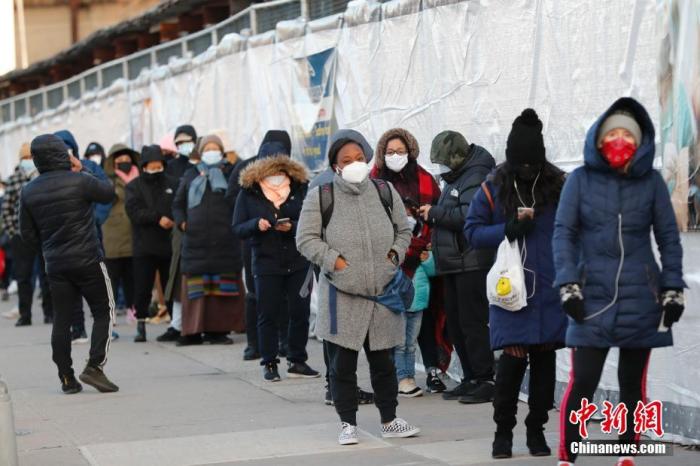Chinanews.com, February 19, according to the US Chinese website, the US House of Representatives Speaker Pelosi said on the 18th that the House of Representatives intends to pass the $1.9 trillion new crown bailout bill before the end of February to extend the unemployment assistance program Distribute relief funds.
Data map: On January 24, local time, citizens lined up for testing at a new crown inspection site in New York, USA.
Photo by China News Agency reporter Liao Pan
Pelosi said she hopes to vote on the bailout bill "sometime next weekend."
The House Budget Committee announced on the 18th that it would merge the terms of the bill proposed by the other committees on the 22nd and vote on the bill, so that a full-house vote can be held before the end of next week.
Some Republicans support a smaller bill, but the Democrats who control Congress and the White House refuse to reduce it.
If Congress does not take action in the next few weeks, a large number of people may lose unemployment benefits.
The US$300 weekly federal unemployment benefit and expanded insurance eligibility requirements will expire on March 14.
More than 18 million Americans have received unemployment benefits.
The Democrats’ plan will increase federal unemployment benefits to $400 a week until August 29.
The bill will also expand the unemployment plan that provides benefits for self-employed and part-time workers during the epidemic.
The bill will also send $1,400 directly to most Americans. For families with children, each child can receive up to $3,600.
It will also invest US$20 billion in the national vaccination program and US$350 billion in state and local funding.
Republicans have criticized the overall cost of the bill, and some centrist Democrats also believe that direct payments should be directed at low-income families.
Democratic senator Joe Manchin previously proposed to set the threshold for disbursement at $50,000 per year.
Although President Biden previously expressed his desire to launch a bipartisan new crown relief program and hinted at raising the threshold for eligibility to issue money, the White House’s recent remarks indicate that Biden is now inclined to quickly advance the $1.9 trillion relief program.
The bill in the House of Representatives also includes a plan to raise the federal minimum wage to $15 an hour by 2025.
The Senate will decide whether the bill meets the rules of the budget bill.
The Democrats are planning to pass the bill through a coordinated process that requires only 51 votes to be approved by the Senate.
But even so, as long as one Democrat opposes the bill, the bill cannot be passed in the Senate.
If the Senate only approves bills proposed by each committee individually, the House of Representatives will have to meet again.

